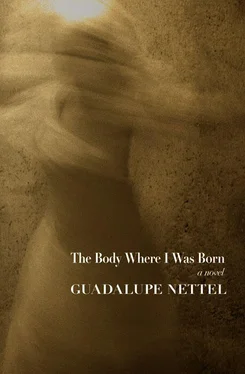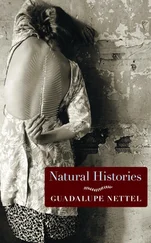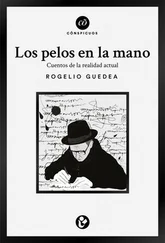But Mom came right away, so she too was able to participate in the tea ceremony with the other guests. She immediately took a liking to our host and they exchanged numbers.
As soon as we left, and from that afternoon on, my mother started calling Lisa the baba cool , a colloquial term for hippies used in France. There were many hippies in Aix in those days, and there probably still are today, as the city suits them nicely. Lisa brought us unto that universe. She knew many parents at the school and had close relationships to some of them. As we got to know her, we discovered that deep down she was a highly intransigent woman. She couldn’t stand anyone with a trace of the bourgeoisie. Her attitude, more than cool, bordered on fundamentalism. Whenever chance brought her to the home of an affluent and conservative family, she would commit acts of class terrorism, like farting loudly at a New Year’s Eve dinner, or dropping her pants to pee in the pool. But with us, she was a perfect lady. We kept visiting her the whole time we lived in Aix, and even after. Sometimes she invited me to go out as if I were a friend, and we’d drink coffee before going to see an art film. Through her I discovered Pedro Almodóvar, whose What Have I Done to Deserve This? I still remember perfectly, despite never having seen it again.
Even though my mother’s boyfriend didn’t live with us, he slept over a lot. As soon as I met him, I knew that we had nothing in common, not even a mutual interest in faking a diplomatic relationship. If Sunil’s strategy with my brother was talking soccer and race cars, with me it was pretending I wasn’t there. Maybe the small age gap between us bothered him, maybe he was scared that an emotional bond between us might look suspicious to my mother, or maybe he found my presence insipid or insignificant. Who knows. His influence on my life was mainly musical and culinary. When he stayed over, the air was full of strong smells like fenugreek and turmeric. He’d often blast Pink Floyd, Bob Marley, and a band called Barcklay James Harvest that I’ve never heard anywhere else. He would often cook homemade curry with coconut milk. It was Sunil’s recipes my mother taught me every time when, in the divvying up of domestic chores, it was my turn to cook. You could call Sunil a communist. He had long and very black hair, a prominent nose and almond-shaped eyes. He was tall, skinny, and dark-skinned. He played soccer at the university, and at home he would lose himself in baffling rituals like staring at the sun and making hand gestures while breathing through only one nostril.
“He’s doing yoga,” my mother explained whenever we’d watch him, intrigued and seeking an explanation for his unexpected behaviors.
Sunil’s family, one of the wealthiest on the island he was from, did not at all approve of his relationship with my mother, whose main defect was not that she was divorced or older, but that she had been raised in a casteless society. But she still went with him to Mauritius several times.
Between the bus stop and school there was a store that sold candy and stationary (in Mexico, candy stores are usually also cigarette shops or pharmacies). I’m convinced the store merchandise one associates with childhood sweets is directly related to adult interests. I, for instance, like the pens and notebooks with heavyweight paper that I know almost as well as I know over-the-counter drugs and deodorants. I should mention that for the first year, French candies tasted a little bland to me. None of them were spicy, florescent, or radioactive-looking, and this greatly diminished my appetite for them. Their names accentuated their difference from those of my country. Instead of Pulparindo and Burbuzest, there they had fruit or animal names: oursons, minibananes, fraises tagada , as if you couldn’t easily distinguish them by the generic substance of which they were made. In short, they lacked mystery and, above all, the scatological aspect that brought repulsed looks to grownups’ faces and increased their appeal. With time I developed a taste for these mild-mannered unambiguous sweets. One of my favorites was the Malabar, a piece of gum that came with a tattoo you could put on yourself with spit, just by licking it and sticking it on your arm. Another was a long caramel called Carambar that tasted like our chiclosos de leche but of better quality.
Our Mexican roots seemed to stir up a curiosity in the kids at school. Whenever they could, they would ask us if we still wore feather headdresses, if we lived in pyramids, or if people were used to driving cars. To impress them, I told them whatever came into my head. I told them there weren’t many cars and that to get to school we often traveled by elephant.
Time passed and the Belgian girl went back to Belgium. This left a vacancy in the friendship with the New Zealander that I didn’t let go to waste. Her name was Nathalie O’Callaghan. We had a few things in common. In addition to being foreigners, she was as tall and ungainly as I was, and her brother Michael, who was the same age as my brother, was also a young soccer star. They lived in a neighborhood very similar to ours. Their parents were also separated, but at least they knew their father’s whereabouts. Unlike everyone else, Nathalie and her mother were not scared to come to our house or to walk about in the area, among the possible criminals. I remember, one afternoon as we were walking toward my house, we came across a tough girl. Everything about her — her black denim clothes, studded bracelets, work boots, and irritable expression — seemed designed to inspire fear. When we saw her, we couldn’t think of anything better to do than to mess with her. It was pretty fun until her sister showed up. For the first time in my life, I was hit by people my own age and the experience very much differed from the hard whacks my mother occasionally dealt me. Rachida and Besma, the girls from the ZAC, gave us a well-deserved beating and, instead of being humiliated by it, I felt like there was something epic and exalting about the incident. Not shedding a tear, Nathalie and I walked to my house with red faces and accelerated heart rates. Luckily no one was home. So there we sat, nostalgically drinking chocolate milk and talking about the customs that come from living in a country colonized by white people, where there were things like KFC, McDonald’s, and Disneyland — things that brought us together and that made us incomprehensible to French kids.
I finished elementary school at La Maréchale and the following year my mother enrolled me at the local middle school, known by the name Collège du Jas de Bouffan. Jas is a Provençal term that refers to a sheep pen, or sheepfold. Decades ago, the place had been a summer residence that Paul Cézanne’s father had bought and which the painter had later inherited. At this school, teachers were no longer progressive and liberal, but the opposite. They tried at all costs to impose an iron discipline to mitigate the rebellious and violent atmosphere that reined among the students. I was twelve at the time. I hadn’t yet gotten used to the metamorphosis my body was undergoing. My clothing was outdated and my haircut looked more like Spike Lee’s than Madonna’s (the model of beauty for the girls in my class). I wore huge pink thick-rimmed glasses, spoke French with a Latino accent, and had an unpronounceable name that sounded vaguely like a French island lost in the Caribbean. The corrective patch yielded results, above all in diminishing my strabismus. Because of the patch, my eyes lined up for almost ten years, but when I stopped using it my eye became accustomed to the delights of lethargy and increasingly turned toward my nose with an exasperating indolence. Forcing it to move would have involved covering up the good eye and thus subjecting myself to the very thing I had so despised and suffered as a young child. So I had to choose between disciplined torture for the sake of physical normalcy — which was never going to be absolute — and resignation. On the other hand, my left eye strove to take in as many sights as possible, all on its own. This frenetic activity produced a trembling movement medically known as nystagmus and which people tended to interpret as insecurity or nervousness. Not even the nerds would come near me. Again I was an outsider, if I’d ever stopped being one.
Читать дальше












